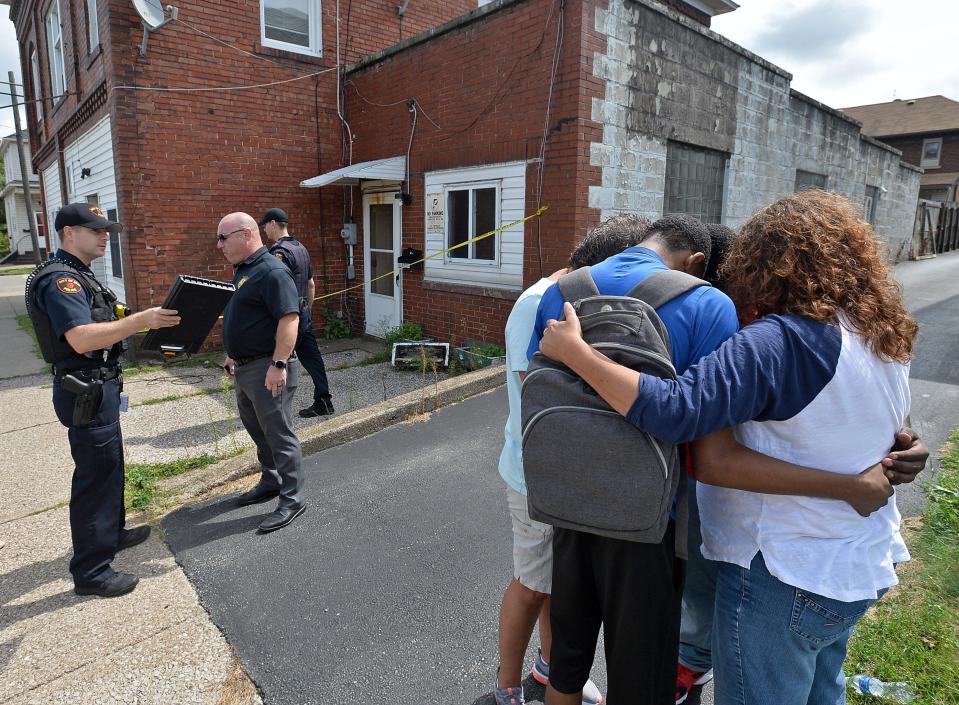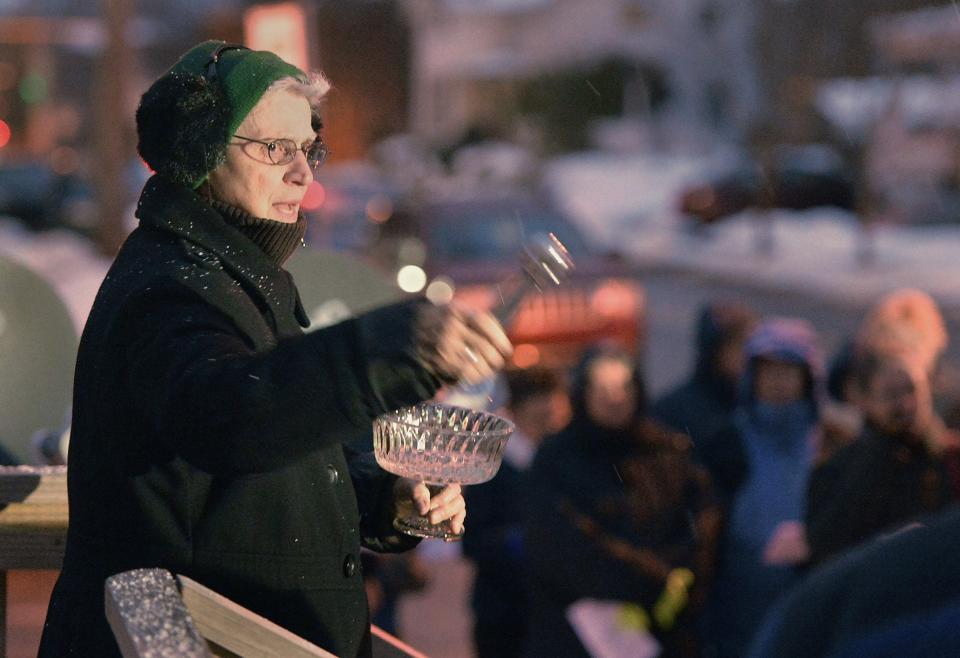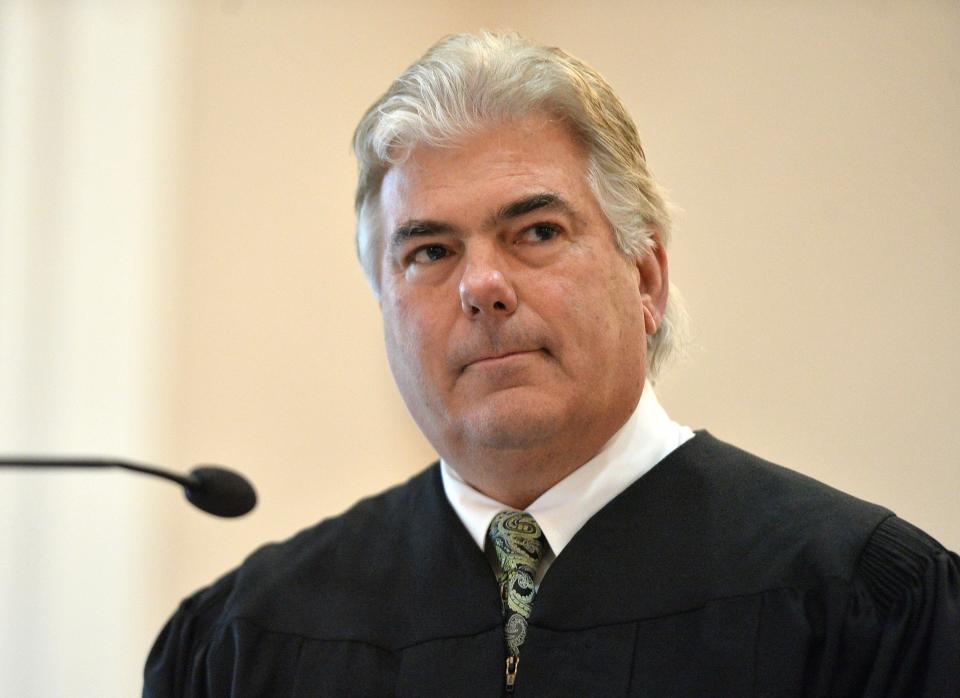Prosecution says 3 teens carried out deadly 2018 crime spree as a 'gang-style graduation'
- Oops!Something went wrong.Please try again later.
The three defendants were in their teens when the Erie police said they committed a series of killings and robberies of drug dealers in the city more than five years ago.
The three were 16, 17 and 18 years old.
The crimes included the deaths of Calvin Isaiah, 24, shot in his bed in late August 2018, and Phillip Anthony Clark, 44, who was partially paralyzed and used a wheelchair and was shot in early September 2018.
The crimes were twisted rites of passage for the trio as they yearned to be recognized as having arrived on the street, a prosecutor said as their trial neared a close in Erie County Common Pleas Court.
The deadly crime spree represented a "gang-style graduation," Chief Deputy District Attorney Jeremy Lightner said. "These kids are doing it because they want to be cool."
The three, Lightner said, were after "street cred." He said their behavior was suggestive of "psychopaths" and "maniacs."
"They are killing because they want to be killers," Lightner said.
Lightner presented the chilling scenario in his closing argument in the case against the three codefendants: Christopher J. Bridges and Destin A. Dortch, both now 22, and Raeshawn D. McCallum, 24.

Their trial, which started with jury selection on Oct. 17 and followed with opening statements on Oct. 20, represents the culmination of a lengthy Erie police investigation that led to the three getting charged with homicide, robbery and other offenses in 2021. The District Attorney's Office is seeking convictions for first- and second-degree murder and for a number of felonies.
Closing arguments were on Tuesday. The jury of nine men and three women got the case on Wednesday morning and deliberated for about 6 ½ hours before Judge David Ridge dismissed them for the day. The jury is to return on Thursday morning.
Deliberations go on: Erie County Courthouse reopens after power outage ends. Jury met throughout closure
Defense targets a cooperating codefendant
None of the defendants testified or presented evidence on their behalf after the prosecution rested on Monday. The defense for each of the three centered on attacking the credibility of one of the main prosecution witnesses, Chinello Blaski, who acted as kind of guide for the jurors into what Lightner called the "grisly underworld" of Erie crime.
Blaski, who was 38 in 2018 and is now 43, is a codefendant charged with second-degree murder in one of the cases. Instead of standing trial with his young counterparts, Blaski testified against them last week.
A self-described drug dealer, Blaski testified he helped the three defendants select other drug dealers as robbery targets — even if Blaski was friends with those dealers, particularly Clark. Blaski said he and the crew of Bridges, Dortch and McCallum went after drug dealers in robberies known as "stings" or "licks" because they believed those victims would be less inclined to go to the police.
In exchange for his role, Blaski testified, he expected to get a percentage of the stolen drugs and cash. He said he had no qualms about helping to hold up his drug-dealing friends, a practice he said is called "backdooring" on the street.
"No honor among thieves," Blaski testified.
The defense argued that Blaski has no honor whatsoever. In their closing arguments, the lawyers for Bridges, Dortch and McCallum told the jurors that Blaski could not be trusted and that he took the stand only in the hope of getting a plea deal later on.
In the prosecution's case, "all things flow from this cesspool of Blaski," the lawyer for Bridges, Keith Clelland, said in his closing argument. "He has no reputation."
The lawyer for Dortch, Bruce Sandmeyer, described Blaski as a "constant manipulator" and a "predator" who excelled at setting up others for robberies and burglaries.

The lawyer for McCallum, Jason Nard, characterized Blaski an evil-minded mentor who was behind the crimes that the three defendants are accused of. Nard asked the jurors to consider the youth of the codefendants. He discounted the prosecution evidence that showed the three bragged of violence on Facebook and in text messages.
The social media posts, Nard said in his closing argument, "could be a kid just trying to sound tough."
"We often have individuals who are not choirboys, but that doesn't meant they did a particular thing," Nard said.
Trial turns into a journey to Erie's 'underworld'
Lightner, the prosecutor, said the evidence showed the three committed all the crimes, despite their age.
Lightner urged the jurors to consider "a plethora of evidence" beyond the testimony of Blaski. The other evidence includes Dortch's fingerprints found on a window of the residence of Isaiah, one of the murder victims, and McCallum's DNA also found at Isaiah's residence.
"The commonwealth does not need Chinello Blaski," Lightner said. "Don't be confused for a minute that this case lives and dies on the word of Chinello Blaski."
Lightner highlighted the testimony of another cooperating codefendant in the case, Nicholas Grayson, 32.
Grayson is scheduled for trial in November. He is charged with casing the residence of murder victim Clark and with being involved in a home-invasion robbery that was party of the 2018 crime spree.
Grayson testified about what he said were he roles of the three young codefendants in the various crimes. His testimony matched what the physical evidence showed and his testimony was consistent with Blaski's, Lightner told the jury. He asked the jury to recognize that Grayson, like Blaski, is not a person to be liked, but is a witness that can be believed.
"These are not people from the leading edge of society," Lightner said. "They are from the tail end, the back end. The witnesses to Erie's underworld are from Erie's underworld."
2018 crime spree is made up of long list of defendants, offenses
The crimes involved and the charges against the codefendants are so many that Lightner displayed them on charts on TV screens to keep them straight for the jury.

● Calvin Isaiah was fatally shot in a break-in at his apartment at East 26th Street and Pennsylvania Avenue on Aug. 29, 2018. Isaiah was a son of Erie County Councilman Andre Horton, who attended the trial.
● Phillip Anthony Clark, known as Tony, used a wheelchair because he was left paraplegic after he was shot in 1997. He was killed at his residence in the 300 block of West 29th Street, near Cochran Street, on Sept. 4, 2018. Clark was killed as he sat on the toilet, naked, and pleaded for his life, Lightner said. The details of what happened in the killing came from Blaski.
● Blaski is charged with second-degree murder and other counts in Clark's death, based on the allegation that he participated in a robbery or other felony in which the victim was killed. He also faces charges in a home-invasion robbery on Sept. 3, 2018, at a residence in the 1100 block of West 20th Street, between Raspberry and Cranberry Streets. The victims were tied up and an attempt was made to set the house on fire.
● Bridges faces burglary, arson and other charges in the home-invasion robbery on Sept. 3, 2018. He is charged with second-degree murder in Clark's death based on the allegation that he was at the robbery but did not kill Clark.
● Dortch faces charges including first-degree murder in the killing of Isaiah and second-degree murder in the killing of Clark. He is charged with burglary and other offenses in the break-in at Isaiah's apartment the day before Isaiah was killed.
●McCallum is charged with first-degree murder in Clark's killing as well as burglary and related charges in the break-in at Isaiah's apartment. McCallum is charged with robbery and other counts in the home-invasion robbery on Sept. 3, 2018.
McCallum faces attempted homicide and other charges in a robbery and shooting on June 18, 2018. The victim in that case said McCallum and a person he did not know came up to him in the area of East 23rd and French streets, shot him in the leg and robbed him of a necklace and a watch.
Bridges and Dortch, who were younger than 18 when the crimes occurred, were charged as adults due to the violent nature of the offenses. The three defendants face life sentences if convicted.
Prosecution says crimes meant to represent a 'coming of age'
In his closing argument, Lightner called the killings of Isaiah and Clark "two of the most horrific murders you can think of."
He argued that Bridges, Dortch and McCallum participated in the murders and other offenses freely, and not as pawns of Blaski or Grayson. The three codefendants might have been young when the crime spree occurred, Lightner said, but he said they wanted to be seen as adults.
The murders and robberies, Lightner said, were meant to be an announcement — "of a new group of robbers, of killers, coming of age and entering this grisly underworld."
Contact Ed Palattella at epalattella@timesnews.com. Follow him on X @ETNpalattella.
This article originally appeared on Erie Times-News: Twin Erie killings called quest for 'street cred' as jury gets case

